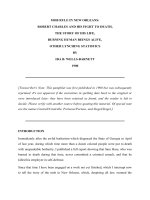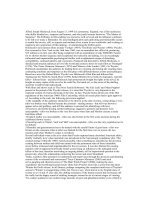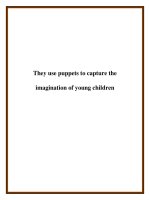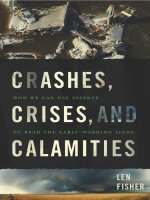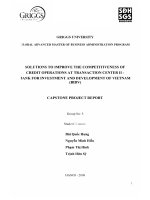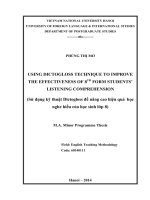how does hitchcock use cinematography to manipulate the emotions of his audience
Bạn đang xem bản rút gọn của tài liệu. Xem và tải ngay bản đầy đủ của tài liệu tại đây (49.03 KB, 4 trang )
Alfred Joseph Hitchcock, born August 13, 1899 in Leytonstone, England, was a film technician
who deftly blended sex, suspense and humour, and who justly became known as "The Master of
Suspense". His brilliance in film-making was envied as well as loved and his influence continues
to be felt over many a filmmaker. He used intelligent plots and captivating and memorable scenes
to enable his movies, still, to surprise and enchant silver screen lovers worldwide; and in doing so,
inspired a new generation of film-making - revolutionising the thriller genre.
Hitchcock's most famous films include 'Vertigo' (1959), 'The Birds' and 'Psycho' (1960). 'Psycho',
first screened in New York on the 16th June 1960, was an immediate box office hit, producing
$15 million in its first year after being completed with an expenditure of only $800,000. Famed
for its shower murder sequence and exceptional shot selection and editing, it is an exceedingly
influential and impenetrable psychological thriller with a nightmarish recipe of disturbing
corruptibility, confused identity and voyeurism. Produced and directed by Alfred Hitchcock, it
shocked and amazed audiences all over the world and created a basis for such films as 'Deranged'
(1974), 'The Texas Chainsaw Massacre' (1974) and 'Silence of the Lambs' (1991). In 'Psycho',
Hitchcock manipulates his audience by leading them on a twisting and turning tale creating many
contrasting emotions and responses as the film plays with different themes events and techniques.
Based on a novel by Robert Bloch, 'Psycho' was Hitchcock's 42nd film and followed his
Technicolor hit 'North by North-West' (1959). Robert Bloch's Novel told of a legendary, real-life
killer - Edward Gein - and after Hitchcock had anonymously bought the rights to the novel, he
bought as many copies of the novel as he could 'lay his hands on', so the secret of the shifting
storyline would be kept undisclosed.
With films and shows such as 'The Swiss Family Robinson', 'My Fair Lady' and 'Mary Poppins'
present in the period of the 'Psycho' release, it is clear that 'Psycho' is very disparate to the
expected content of cinema showings at the time. In fact, 'Psycho' broke all but one of the film
regulations of the American 1960's Film Censorship, which all screen plays had to gain approval
of. According to the code, the following provisions applied:
1.The sympathy of the audience should never be thrown to the side of crime, wrong doing or evil -
(this was broken once Marion became the criminal - stealing money - but still was shown to
appear naïve and guiltless, and still the audience is pressed into identifying with her.)
2.Excessive and lustful kissing, lustful embracing, suggestive gestures and postures were
unacceptable - (this was broken in the very first scene when Sam and Marion execute a seedy
lunchtime affair)
3.Explicit nudity was unacceptable - (this was also broken in the first scene and also during the
celebrated shower scene)
4.Swearing such as 'Damn', 'God' and 'Hell' was unacceptable - (this was the only regulation not to
be defied.)
5.Brutality and gruesomeness has to be treated with the careful limits of good taste - (this was
broken on the occasions when a toilet was flushed for the first time ever on screen, the two
murders and when 'Mother's' corpse is revealed.)
Several individuals went as far as to claim that Psycho ruptured many cherished American ethics,
chiefly 'motherly love' when matricide was introduced to the 'increasingly scandalous' plot. This
created outrage within the 1960's American public when something as sanctified as the devotion
existing between mother and child was tainted with the permanent stain of these inimitable,
never-before witnessed and unpardonable (for the era) scenes. It was also blamed for causing
murders with its apparent horrifically brutal scenes being an influence to the unhinged serial
killers of the time; therefore motivating an ongoing debate, still in impassioned question in the
present day, about the relationship connecting the screen and street bloodshed.
Today, countless film spectators sit undeterred and impervious through the atrocious and daunting
scenes of the re-released and restructured 'Texas Chainsaw Massacre' (2003) and such
nerve-jangling and ethereal scenes of 'The Blair Witch Project' (2000); making the once
'scandalous' and 'terrifying beyond reason' shots from 'Psycho' more like a scene from the latest
'Winnie the Pooh' release. In all fairness, perhaps comparing the complete timid-ness of 'Psycho's'
scenes to 'Winnie' is exaggerating a little, but I have to say, when shown to my English class of
twenty or so 14 and 15 year olds, the chilling resonance of the human scream did not bounce off
the walls, but the happy sound of cackling teenagers seemed to air at various stages of viewing.
Yes, today's audiences can swallow huge amounts of gore and ghastliness before even a flinch is
spotted. At present, filmmakers must break down a great barricade of fearlessness to jolt present
day spectators, contrastingly, in the 1960's this barricade was more of a small hedge, but still,
Hitchcock obliterated this with a 10 tonne bulldozer.
Hitchcock specifically requested that no people could enter the cinema to witness 'Psycho' once it
had started, which at a time of cinema-goers thinking it natural to enter a film half-way through,
was an abnormal request; an abnormal request that transformed the way we see films at cinemas
today. One motivation for this demand was for one, that Janet Leigh - already a 1960's star and the
only 'known' individual in the film - was 'killed off' in the first third of the film. This would have
disappointed late-comers as I'm sure - just like today some (teenage girls in particular) would set
out to see a film just because Brad Pitt, for instance, was starring - people of the time would go to
see 'Psycho' for the reason that one of the biggest sex icons of the time - Janet Leigh - was in it.
Another reason would be that late arrivals wouldn't feel the immense, nerve-tingling effect of the
opening credits. Accompanied with high, A-tonal music without direction, it crafts anxiety and
edginess among the emotions of the audience and forewarns viewers as to what the film will
contain.
The opening credits are in cold black and white which stresses the gothic darkness of the film, and
adds emphasis to the contrast of the stark white lettering against the pitch black background.
Rapid, slicing wipe-editing is added to the credits to generate a 'slashing' motion; this may well
replicate a knife gashing skin (a main ingredient of the storyline). The music is very high-pitched
short, dramatic and jarring to create anxiety and it engages interest - mimicking a nervous heart
beating hurriedly. The split-screen effect suggests themes of the following movie are below the
obvious and superficial. These effects and the non-directional music give the credits a swift pace
which captures the attention of the audience and intrigues them using 'edge of your seat'
techniques.
'Psycho' consists of many effective and dominant scenes using various 'on edge' atmospheres,
non-diatonic or non-directional resonances and shots using darkening shadows to conceal or
emphasise facial emotions, clever props to cunningly develop the storyline and subliminal
messages.
Personally, I feel that the two most powerful scenes are the opening scene - of Marion and Sam's
shameful and sordid lunchtime affair - and the ending scene - the unforgettable eeriness of the
zoom in on Norman when 'Mother's' voice is heard. I think these two scenes are the most
memorable because they seem to be prominent to other scenes and their impact on the plot and
audiences' emotions is immense.
The opening scene begins with a panning shot of the city of Phoenix which then homes in on an
'unplanned' window where voyeurism is apparent as "you never did eat your lunch" is kinkily
asked and we become 'Peeping Tom' on a fervent lunchtime 'quickie' in a low-priced hotel room.
A feeling of awkwardness and of that we really shouldn't be viewing this couple's 'quality time' is
noticeable as the viewers are deluded into thinking that the build up to a terrifying thriller in the
opening credits is all a façade and the valid theme of the film is of cheap sexual thrills; a disgrace
of the time which, in many peoples' eyes, should be kept well behind closed doors and not paraded
on a large screen. However, the theme of a thriller is still secretly apparent in the scene as the
parallel blinds are shown to be 'slashing' the screen horizontally, much a replica of the editing
from the opening credits.
Today, this scene is the type that would be accepted for the 7 o'clock slot on BBC, as sex is quite
frequent on today's screens. Today, outcries of shock aren't heard if two people are seen to be just
that bit too close, in fact, from music videos on 'MTV' to adverts and even the odd 'Disney' movie,
we cannot escape sexual experimentation and it has become a huge part of our lives and 'big cats''
incomes as scenes get more and more 'risqué' every year.
In the opening scene, Hitchcock uses 'close-ups' on the uneaten lunch to emphasise the reason why
she hasn't consumed it, and also he applies the same technique to accentuate Marion and Sam
kissing and the fact that they are lying half unclothed on a bed together. This stresses the ploy to
render the audience to wrongly think the movie's theme is of sexual ecstasy and not of a chilling
thriller. Other camera shots Hitchcock employs are showing Marion's facial expressions when her
back is turned to Sam, this way the audience can better connect with her as they can associate her
facial appearance with what she is feeling and are therefore able to feel the same.
As well as clever camera shots, Hitchcock also makes the best of the advantages of shooting a
movie in black and white by laying emphasis on the way Sam is feeling by using the concealing
shadows to faintly block what his facial expression are when he is talking of his ex-wife. This
symbolises that Sam is upset about his past and wants to hide away from it.
The lighting is quite dull to suggest that there is something taking place in this inexpensive setting
that shouldn't be brought into full daylight and should be veiled. However, the shot isn't in
complete darkness or anywhere near it which suggests that Hitchcock wanted the audience to
know exactly what was happening and there were no doubts about what was happening, it was
very 'in-your-face'. Also the daylight and clear weather suggest that Marion and Sam are not
ashamed of what they are doing and although it is hidden, in this case, behind horizontal blinds, it
is still something that ensues. This reality was in the process of being an acceptance in the
community; Hitchcock was just giving the truth a helping hand to emerge.
In the scene the audience is imposed into sympathising with the character of Marion, learning that
she is independent in her thoughts as she informs Sam that 'it's over'. Furthermore that she is calm
and sensibly outgoing but still has sudden illogical outbursts that make her less of a character and
more of human - something that the audience can relate to. This is the foundation of an ingenious
plan to coerce the audience to believe that when Marion steals the money she's innocent and pure,
when in actual fact Marion's law-breaking character is unmistakably culpable - thieving a huge
amount of money for the time period. Hitchcock, however, appreciates that Marion is on the
wrong side of the law subsequent to stealing the money, so separates the guilty and the guiltless
personalities of the character by nothing other than the underwear worn. To elaborate on this point
- Hitchcock dressed Marion in white (representing purity and virtuousness) underwear prior to her
committing a felony, then in black (representative of guilt and darkness). Very clever, Mr.
Hitchcock!
Once the mystifying storyline has been solved, Norman (or 'Mother' should I say) has been
imprisoned and countless questions are answered, 'Psycho' is ended with a disturbing and
unsettling scene of Norman alone in a shadowy cell when 'Mother' has entirely taken over
Norman's mentality. Norman's guilty conscience pushes him to punish himself for what he has
done and the attraction he felt towards Marion.
In this scene it is silent which creates a more apprehensive atmosphere and an element of
suspense. Also, the lack of music enables the audience to think more for themselves as to what the
theme of the scene is and what will occur to conclude it. Norman's facial expression is very still
and calm; his eyes meet with the camera to create a feeling of discomfort and uneasiness, the stare
also makes him look very ill-omened and creates suspense. He is sporting a blanket which
symbolises that he is burying himself behind it and he has a guilty conscience that he is trying to
hide from others. This blanket could also symbolise that the insignificant element of Norman left
is using the blanket as a barrier to attempt to confine his 'Mother' and not let her expand any
further than she already has.
The scene hears 'Mother' condemning her son and commenting that she would 'never hurt a fly'.
This remark is in reality the truth as 'Mother' is dead and so her killing someone is fairly
impossible, however, what Norman remembered of his Mother lived on inside of him, nagging
away at his already deranged mind, and this memory is the real killer, using Norman's body as a
puppet to do the physical work. The statement is very effective as it forces the audience to think
about the situation which makes the scene more memorable, and creates a sinister atmosphere and
a feeling of an unwelcome presence attending the scene.
The camera stays focused on Norman's face, generating a nervous feeling among the audience,
and then zooms in very slowly towards Norman. This dawdling zoom-in creates suspense and is
very creepily effective. The lighting is very dull and gloomy to suggest a dark and sinister
presence and theme. The dimness establishes an element of fear as the audience gets a feeling that
anything could lurk in the shadows, or Norman could do anything at any minute. This lack of light
is also symbolic of Norman's guilty conscience as, along with the blanket, creates a shade for him
to hide behind.
The room contains nothing but Norman, so, when the audience puts themselves in the room, they
get the feeling that there is no-where to hide. Also, the lack of objects symbolises that finally the
truth has materialized as the room is clear of items for the reality to disappear behind.
In the closing stages of the scene, a faint image of a skeleton creeps over Norman's face. This is
especially disturbing as, as soon as the audience thinks they understand Norman's mental
condition, the skeleton makes an appearance and we are abruptly thrown back off course as a
supernatural element is added to the running of explanations. This is effective because it creates a
great debate for the public to argue about of whether the skeleton visage was significant to the film
or not. This way would enable more people to go to see the movie to discover the truth, and even
if people were arguing about the movie, as they say 'bad publicity is still publicity', which may be
a reason why the film did so well.
The audience has recently been shaken with the true storyline - Norman's mental state, not
revolving around the money - so they have no inspiration as to what will happen in the subsequent
scene. Therefore, they have no expectations for the scene creating more trepidation and eeriness as
the film's winding road of events could now turn in any direction.
I think the ending scene is by far the most powerful. Its originality has the ability to linger in the
mind of the audience for some time following and therefore is extremely memorable. The scene
combines the daunting and ethereal themes to form an extraordinary, original ending that will
unnerve you to the core as it entwines sinister sensations and mystification throughout your mind.
Hitchcock's brilliance in this scene can never be reproduced; however, Hitchcock illustrates his
giant power most effectively in the opening scene when he successfully deceives the audience into
thinking the film has an utterly contrasting topic. This opening scene also demonstrates
Hitchcock's supremacy as this scene created one of the biggest reactions ever, triggering a chorus
of disapproval all over the world and possibly facilitating the film to be as huge as it was (or is).
Hitchcock was a great filmmaker of the thriller genre crafting countless unforgettable movies that
at the time could not be faltered. However, I think that if Hitchcock was around today to witness
the astounding techniques used by current filmmakers, he could learn something new, like, for
example, how to make someone appear to be falling down some stairs more realistically - one of
the more unsuccessful qualities of the film. I think that if 'Psycho' was released now, the public
would dismiss it beyond a shadow of a doubt firstly because it is filmed without colour. Secondly
because there is no amount of gore or a great extent of violence, neither does it have any swearing
to, let's admit it, make the film more 'cool'. Also, Janet Leigh, doesn't, if truth be told, have the
qualities anymore to be the 'girl every man wants'. So, to bring it all together, the supposed thriller
film, today, would be without colour, tame, 'uncool' and 'unsexy'. Not really the film that everyone
will rush to see, is it?
However, Hitchcock, although he may be slightly dated for the present and even his ten tonne
bulldozer wouldn't make a scratch on the vast barricade that present day thriller filmmakers must
conquer before audiences are even vaguely fearful, his colossal dominance over the global public -
an amount that cannot be matched - and his aptitude to fashion a worldwide uproar will be
reminisced for years to come. He was an incredible influence for thousands of filmmakers
throughout the years and his work will continue to be applauded and honoured. He will go down
as one of the greats the world procreated.


